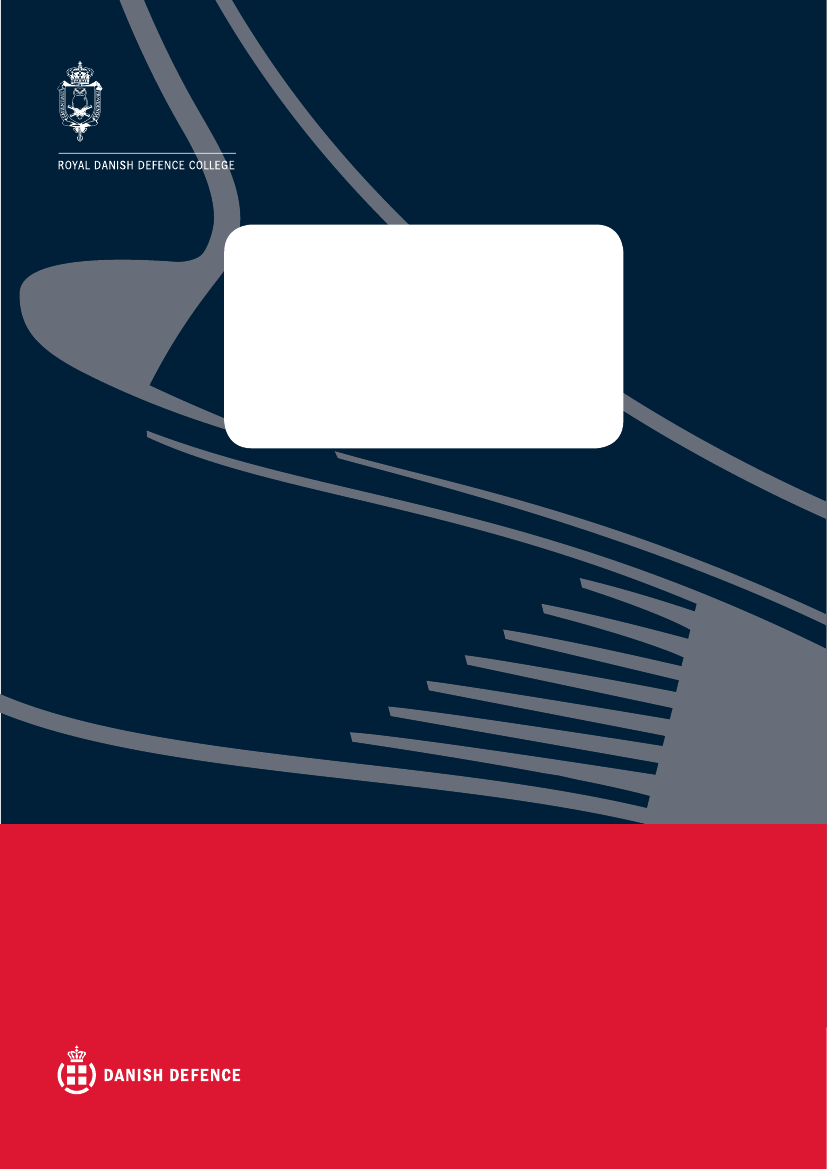NATO's Parlamentariske Forsamling 2012-13, Det Udenrigspolitiske Nævn 2012-13
NPA Alm.del Bilag 22, UPN Alm.del Bilag 300
Offentligt
BRIEFNATO’s Criteria for Intervention inCrisis Response Operations:Legitimacy and LegalityBy Commander Pedro Perez-Seoane Garau,Spanish Ministry of Defence
RDDCPUBLISHING HOUSE
BRIEFNATO’s Criteria for Intervention inCrisis Response Operations:Legitimacy and LegalityBy Commander Pedro Perez-Seoane Garau,Spanish Ministry of Defence
Commander Pedro Perez-Seoane Garau from theSpanish Ministry of Defence wrote this brief whileattending Senior Course 122 at NATO DefenseCollege in Rome, Italy.
The Royal Danish Defence College is the Danish armed forces’ powerhouse for education, training andresearch-generated consultancy. Our research is conducted within a broad range of military-related topics.Our research priorities, such as topics and resource allocation are determined by the Commandant of theRoyal Danish Defence College, who is aided by a research council.Research at the Royal Danish Defence College should enlighten and challenge the reader, whether they arein the armed forces or in the surrounding environment. This is only achievable if the employees have thefreedom to administer their own research projects and draw their own conclusions. This is a principle, whichis honoured at the Royal Danish Defence College.We hope you enjoy reading the Royal Danish Defence College’s publications!� Royal Danish Defence CollegeAll rights reserved. Mechanical, photographic or other reproduction or photocopying from this book or partsthereof is only allowed according to agreements between The Danish Defence and CopyDan.Any other use without written consent from the Royal Danish Defence College is illegal according to Danishlaw on intellectual property right. Excepted are short extracts for reviews in newspapers or the like.
Copenhagen September 2013Royal Danish Defence CollegeRyvangs Allé 1DK-2100 CopenhagenDenmarkPhone: +45 3915 1515Fax: +45 3929 6172Editor: Acting Director of the Institute for Strategy Peter Kim LaustsenLayout by B-O. KureISBN: 978-87-7147-030-7Royal Danish Defence College Publishing House
Royal Danish Defence College
IntroductionAfter NATO was founded in 1949, its forces were not involved in a single militaryengagement until the early 1990s. In 1992, NATO got fully involved in thefirstcrisis response operation in the new post-Cold War era. NATO forces were deployedto enforce the UN arms embargo on weapons in the Adriatic Sea and to enforcethe no-fly zone declared by the UN Security Council in the Balkans conflict. Sincethen, many other crises have triggered interventions by NATO beyond its traditionalarea of responsibility, all of them non-Article 5 operations, except for the ongoingOperation Active Endeavour (OAE) and the AWACS support mission after the 9/11terrorist attacks in New York.The purpose of this brief is to analyse NATO’s criteria for intervention in CrisisResponse Operations. For obvious reasons, an Article 5 contingency should notpresent, in principle, any legitimacy problem since it is, by definition, a self-defenceintervention covered expressly by the UN Charter. Yet interventions in CrisisResponse Operations present some difficulties in regard to the decision-makingprocess leading up to the use of force and to the way the operations are conducted.In legal terms, these are theius ad bellumand theius in bello.When and underwhich circumstances it is legitimate to intervene with military force in a sovereigncountry is the question theius ad bellumtries to answer. How to behave during theconflict is addressed by theius in bello.Although both are deeply interconnected,the scope of this brief will cover only the legitimacy criteria for intervention, butsome reference to the employment of military means will be made to underline thatinterrelation in a way that shows that an initial legitimate intervention can turn outto be unjust because of the way it is executed. As Professor Kuzniar summarizes,“Evena just war ceases to be just when it is waged by inappropriate means.”1From the outset, is it necessary to state that legality and legitimacy are notequivalent concepts, even if they are used synonymously in debate. A legal waris one authorized by international law, i.e. in accordance with the UN Charter andthe decisions of the UN Security Council. Legitimacy is more of a moral conceptimpossible to translate into positive law, hence its controversial essence2. It hasbeen more or less systemized through history in the so-called Just War Tradition,which will be the yardstick for measuring the criteria analysis that follows. Some
(1)Roman Kuzniar“The contemporary world and use of armed force: legal and political dilemmas”The Polish Quarterly of International Affairs,18.4, 2009, p. 63-71(2) AsPavel Barsaputs it when referring to an intervention without a UNSC mandate, “Suchanintervention is clearly ‘illegal’ even if it may be conceived of as morally ‘legitimate’”.In Pavel Barsa,“Waging War in the name of Human Rights? Fourteen Theses about Humanitarian Intervention”.Institute of International Relations,Prague. Perspectives: Summer 2005, p.10Nigel Whitemakes the same distinction about the Kosovo intervention: “..itwas felt that the useof force may not be clearly lawful but was nevertheless legitimate”.Nigel D. White “Libya and thelessons from Iraq: International Law and the use of force by the United Kingdom”.NetherlandsYearbook of International Law42, Dec 2011, p. 225. Finally, a commission of experts found theintervention in Kosovo to be “illegal but legitimate” as reported byAlex J. Bellamyin his “Just Wars:From Cicero to Iraq”,Polity Press,Cambridge 2006, p. 215.
3
argue that the UN Charter is the modern translation of the Just War Tradition and thatthe concept is not useful anymore since the Charter now regulates the internationaluse of force. But I am more of the opinion of Delahunty and Yoo that the Charter“isfar from codifying traditional just war theory”and that the two instruments arebetter viewed as complementary3.
NATO’s Criteria for InterventionDoes NATO have standard criteria to decide whether to intervene in a humanitariancrisis situation in a sovereign country? Of course, thefinal decision will always be amatter of consensus among the 28 member nations, but that consensus must bebuilt upon safe grounds of coherent policy and moral standards. The answer to thatquestion cannot be found in any of NATO’s documents, but recently NATO officialshave referred to “the criteria”, or the conditions, that must be satisfied to allow foran intervention. It all started with Operation Unified Protector in Libya in 2011 underthe mandate of UN Security Council Resolution 1973 of 17 March 2011. This is thefirst mandate ever by the Security Council for a military intervention based on theResponsibility to Protect – or R2P – doctrine.During the internal NATO debates preceding the operation, the long shadow of theIraqi war was always present, and there was a fear of precipitation. The UnitedKingdom led the debate and presented a set of three conditions to be met priorto authorizing the humanitarian intervention in Libya. These conditions weredemonstrable need, regional support and a clear legal basis4. Since AmbassadorMariot Leslie, the Permanent Representative to the North Atlantic Council at thetime, was the one who presented them to the NAC, they are now commonly referredas the “Leslie criteria”. Since then, there has been a shared understanding thatthese are NATO’s standard criteria for intervention.Thefirst conclusion is evident: these criteria are very different from the ones usedfor the humanitarian intervention in Kosovo in the spring of 1999. Then, the lack ofany legal basis triggered some international criticism of the operation. Actually, theLeslie criteria have some precedent in the Blair Doctrine laid out by Prime MinisterTony Blair in a speech in Chicago on 22 April 19995.The analysis of these three criteria in light of the Just War and R2P doctrines canhelp us evaluate their suitability to better inform the decision making process ofour leaders in general, and of NATO in particular. Throughout this analysis, thecomparison between the Kosovo and Libya cases recurs in order to better illustrate(3)Robert J. Delahunty and John Yoo“From Just War to False Peace”.Chicago Journal ofInternational Law13.1, Summer 2012, p. 36 and ss(4) Statement of the UK Prime Minister to the House of Commons on 18 March 2011. And repeatedon a substantive motion on 21 March, two days after the RAF had become involved in the militaryaction. SeeHansard,HC Vol, 525, Col. 700, 21 March 2011 (David Cameron MP).(5) SeeChris Abbott.“Rights and Responsibilities: The Dilemma of Humanitarian Intervention”Global Dialogue7. 1/2, Winter 2005.
4
Royal Danish Defence College
the study and to help us to raise some considerations in relation to Syria’s currentcrisis.
Demonstrable need: the case to interveneThe key prerequisite is, of course, an obvious case, a demonstrable need tointervene. It is common understanding that a ruthless violation of human rights mustbe occurring or will occur imminently. The right to intervene in such circumstancesis considered an exception to the universal principle of territorial sovereignty (Art.2(4), 2(7) of the UN Charter), even if the only formal exceptions to it are self-defence(Art. 51) and Security Council enforcement for the restoration or maintenance ofinternational security and peace (Chapter VII). Humanitarian intervention is an old“just cause” to wage war already contained in the Just War spirit, and it’s at the coreof the modern Responsibility to Protect doctrine of the UN. The main obstacle toapplying this criterion is identifying where the threshold of an unbearable violationof human rights is in order to justify the exceptional measure of intervening againstthe will of the affected country. There is no clear answer to this, but a good ruleof thumb is the “minimalist definition” of fundamental human rights proposed byPavel Barsa6(following Michael Walzer in this regard), i.e. only massacres, ethniccleansings and forced labour.The humanitarian crisis in Kosovo in 1999 was considered by NATO members tohave gone well beyond the threshold, and the aerial campaign over Serbian targetsstarted in spite of the lack of authorization by the UN Security Council. There is littledoubt about the illegality of NATO decision but, at the same time, there is broadconsensus that it was the right decision - a legitimate one, a moral duty. And it wassuch because it complied with the Just War Tradition precepts.A retrospective application of the R2P doctrine to that intervention also affirmsits correctness. This doctrine, presented by the ICCIS7to Kofi Annan in December2001, comprises three specific responsibilities: to prevent, to react and to rebuild.All of them were exercised by NATO. It also contains four principles: right intention,last resort, proportional means and reasonable prospects. Again, in our opinion,NATO broadly respected those yet to be stated principles. The only caveat someanalysts offer up about the legitimacy of the operation is in regard to the meansemployed during its execution: it is not clear if the high altitude bombing posed anextra risk to the civil population8, which would have been an infringement of theproportionality and discrimination principles of theius in bello.
(6)Barsa(2005), p. 7(7) The International Commission on Intervention and State Sovereignty (ICISS) was establishedby the Prime Minister of Canada during the UN Millennium Summit in September 2000. R2P is fullyexplained inAbbot(2005).(8) There are opposing opinions about this issue. SeeHugh Beach“Secessions, interventions andjust war theory: the case of Kosovo”Pugwash Occasional Papers,Volume 1, Number 1, February2000.http://www.pugwash.org/reports/rc/beach.htm
5
The same conclusion can be reached about the Libya intervention; in our opinion,the previously mentioned UN Security Council Resolution 1973 only added aplusof legality, but NATO should have intervened without it - we will come back to thisin thefinal section. But ironically, in spite of its extra legality, the Libya interventionhas provoked much more international criticism. If the operation’sfinal phase wascraped to effectively become a regime change including support of the rebels, thenthe initial legitimacy of the operation was lost, not only because regime change wasnot authorized by Resolution 1973 (therefore making the execution of it illegal) but,mainly, because it was no longer a humanitarian intervention. In other words the“right intention” principle would have been violated9. The aftermath of Libya hascreated the perception among many that NATO abused the international order andthe Security Council mandate; this is the main reason stated by Russia and China10for vetoing any resolution to intervene in Syria, and it will probably undermine thepromising prospects of the R2P doctrine in the Security Council for some time to come.From the humanitarian perspective, the situation in Syria is very similar to the onein Libya before the NATO intervention11. Nevertheless, according to NATO officials,there is no intention or appetite to consider intervention for the time being. Thatbrings to the table another related issue that is not possible to address in the spaceof this brief, but is worthy of mentioning: “selectivity” in humanitarian interventionaffects the credibility.The point to make here is that the international responsibility to avoid crimesagainst humanity should no longer be a choice – it should be a duty. The recourseto arguing a lack of national interest or appetite reveals that we are still far awayfrom a pure humanitarian ethic unmixed with other political considerations. And(9) Besides, NATO has officially refuted these accusations, and some argue that it was not NATObut individual states that deviated from the mandate. The article jointly published by US PresidentBarak Obama, French President Nicolas Sarkozy and British Prime Minister David Cameron on 14April 2011 does not help the official posture. There is also evidence that at least France, Qatar,Canada and Egypt supplied arms to the rebel forces. Unsurprisingly, some NATO and US officialshave also mentioned “regime change” and “rebels support” when asked about Libya during theirlectures and briefings, according to the last NDC Field Study. Finally, some try to justify the regimechange by alleging “intervention by invitation”, but there is wide consensus that that is not allowedin a civil war scenario.(10) Not only Russia and China, but South Africa, India, Brazil, and others have joined in the samecriticism and in feeling betrayed by the UK, US and France. SeeGeir Ulfstein and Fosund Hege“TheLegality of the NATO bombing in Libya”The International Comparative Law Quarterly62.1 Jan 2013,p. 160 and ss.Of course, Libya is not the only reason for Russia and China to oppose any resolution about Syria.They have interest in maintaining the status quo in Syria, but now they have a good alibi to do sowithout further explanations.(11) As reported byUlfstein,“At the end of April 2011 the revolt in Syria already displayed similarfeatures to the Libyan uprising at the time the Security Council decided to intervene militarily toprotect the civilian population there” and by September 2012 “the intensity of the conflict hadreached the legal threshold for a non-international armed conflict”. Ibid, p. 170It is important to stress that the situation in Syria is only similar to Libya, as said, from the humanitarianperspective. It is understood that Syria is a more complex political scenario, and many other factorsaffect the decision to intervene, as always.
6
Royal Danish Defence College
that doesn’t mean advocating for NATO to become the police of the world: that’snot its mission, it would be unrealistic, and it would generate instability and conflict.
Regional supportThis second condition, having regional support, is very much related to themultilateral approach to crisis management. But it is also a valid measure for someJust War principles in regard to the probability of success and the responsibilityto rebuild. Going back to multilateralism, it is very often presented as a credentialfor legitimacy. The argument behind it is that, when many democracies reach aconsensus and join together tofight someone else, it can only be because it is ajust cause to use military force and to wage war. As considered by Barsa (2005),“internationalmultilateral decision-making function(s) as a test for universality…”,and he concludes, “Forthis reason multilateralism is the most general answer to thequestion of how we distinguish an imperialist conquest disguised as a humanitarianintervention from a real humanitarian intervention.”In our opinion, that is a very pragmatic but weak philosophical argument and, ifaccepted, it would make useless any further debate about the legitimacy of theinterventionvis-à-visthe Just War principles. Therefore, we follow Walzer’s judgmentin regard to this issue of multilateralism. In his opinion, numbers do not matterwhen dealing with legitimacy - broad support and consensus or even a UN decisioncannot legitimate a wrong decision to go to war. As he puts it, “Statesdon’t losetheir particularist character merely by acting together”12.Finally, the concept of regional support is so vague that it can hardly serve as adiscriminative factor to qualify the legitimacy of an intervention. As an example, inthe Libya crisis, regional support was claimed even though the African Union opposedthe intervention. So, which is the region to be considered? Is it a geographical oran ideological region? It is true that the Arab League did support it initially, butthere are serious doubts about its support for the operational development of theintervention; its Secretary General, Amr Moussa, deplored the bombing campaignand declared “Whatis happening in Libya differs from the aim of imposing a no-flyzone”and then he underlined the authorization to protect civilians in Libya, but notto enforce regime change13.In conclusion, while regional support and multilateralism have some significanceas criteria for intervention, great care should be taken not to overestimate theweight those factors have relative to the more fundamental principles of the JustWar Tradition.
(12)Michael Walzer,“Justand Unjust War:. A Moral Argument With Historical Illustrations”.ThirdEdition, Basic Books, New York 1977. p. 107(13) “The Goal in Libya is not Regime Change”,New York Times,March 30, 2011. And inhttp://www.washingtonpost.com/world/arab-league-condemns-broad-bombing-campaign-in-libya/2011/03/20/AB1pSg1_story.html
7
Thisfinal criterion has already been addressed partially along with the legitimacyissue discussed above. Nevertheless, it deserves a few more comments. The needfor a clear legal basis emerged strongly in the Libya intervention as a consequenceof thefiasco of the invasion of Iraq some years before. This time, the Allies struggledto obtain a clear mandate from the UN Security Council; it was a must. But onecould argue that once they had the green light, Resolution 1973, it was interpretedand executed against its spirit and in obliviousness of the noticeably restrictiveatmosphere that characterized the preparatory debates in the Security Council. Thatraises the question of whether a Security Council mandate is a binding documentor only a tick mark on the check list beforefiring.In any case, the weight of the Security Council resolutions is relative. Taking intoaccount the Security Council’s deficit of democracy, its numerous cases of paralysisand its inability to properly control its own mandates, its resolutions cannot beconsidered the blessing of legitimacy. And legitimacy is what truly counts, not theformality of a legal document. Abbott goes even further and alerts us: “Theproblemis that its decision whether or not to intervene in a particular conflict does notnecessarily reflect internationally agreed objective criteria and legal norms, but thedomestic and global imperatives of thefive permanent members.”14Therefore, it is dangerous to set this legal basis as a “go-no go” criterion for thefuture. In thefirst place, having a Security Council resolution is not unbiased proofof legitimacy; and even worse, failing to obtain it could paralyze an interventionnecessary to stop a human disaster. Syria could be a sad example of this.One possible solution to the threat of paralysis in the Security Council is to promote theauthority of the General Assembly, using the Uniting for Peace procedure that allowsit to recommend collective action and use of force. It was used, for example, in 1956by the United States when Egypt was attacked for nationalizing the Suez Canal.15To be fair, we must acknowledge the unique relevance of the Security Council ininternational security, especially in the application of Chapter VII of the UN Charter.And, in spite of its deficiencies, it is probably the best we can have to do the job.We are only trying to put it in perspectivevis-à-visthe Just War Tradition, because,as said before, both must be complementary in the decision making process. TheUN Charter is not enough. In Delahunty’s opinion, it is even worse than that: “…theCharter’s use of force rules thus erect a formidable legal barrier to the protectionof human rights and to the safety of populations at risk throughout the globe”.16In summary, while it is very convenient to act under the umbrella of Security Councilresolutions, the lack of Security Council authorization should not be treated as ared line in severe humanitarian crises.(14)Chris Abbott(2005) p. 5(15) For details about the Uniting for Peace procedure, seeChris Abbot(2005).(16)Robert J. Delahunty and John Yoo(2012), p. 37
Clear legal basis to intervene
8
Royal Danish Defence College
ConclusionFollowing this brief analysis of the so-called “Leslie Criteria”, thefirst conclusionis that NATO has made a very commendable effort to advance and set legal andethical standards that facilitate consensus among member nations in the alwaysdifficult decision to intervene in a Crisis Response Operation.The analysis of the three criteria in light of the Just War Tradition principles revealsthat these criteria do not suffice for deciding on an intervention and conducting it.A more comprehensive examination is necessary to include those principles andthe new Responsibility to Protect doctrine. Paradoxically, the Libya intervention,which had the clear legal basis of a UN Security Council resolution, ended up beingexecuted on the fringe of legality, and its legitimacy is very contentious. On the otherhand, the illegal Kosovo intervention is considered legitimate and a positive stepforward in shaping the emerging Responsibility to Protect doctrine.Therefore, NATO as an Alliance and, most importantly, the individual nations andtheir leaders should put more focus on the legitimacy strands of their decision-making process and in designing the policies for intervention. For that purpose,the Just War Tradition should be better incorporated into their political agendas.As practical means to accomplish that, we offer some proposals to be investigatedfurther:-To incorporate the subject of the Just War Tradition into the academiccurricula of the military staff colleges and diplomatic schools, includingthe NDC.To influence the future management of the UN Security Council and itscredibility by seeking a compromise to work out an agreement on a specialprocedure for humanitarian interventions. Such a procedure should aim atprecluding the body’s frequent paralysis and should include mechanismsthat foster better control over the execution of interventions.To promote the development and institutionalization of the Responsibilityto Protect doctrine in the UN.
-
-
Let mefinish with a reflection by the eminent Professor Walzer that very accuratelysynthesizes the thesis of this brief: “Justwar theory now provides the crucialframework, the vocabulary and the conceptual scheme, with which we commonlyargue about war. This is the way war has to be examined and defended, and I hopethat sets some limits on decision-making. But decision-makers are commonly movedby a complex set of considerations, in which politics and economicsfigure alongwith but also, usually, before morality.”17
(17)Michael Walzer,“Words of War: Challenges to the Just War Theory”,Harvard InternationalReview,Spring 2004, p. 37
9
BibliographyBooks:Bellamy, Alex J. “JustWars: From Cicero to Iraq”,Polity Press, Cambridge2006.Sanchez de la Torre, Angel y otros, “Guerra,Moral y Derecho”,Real Academiade Jurisprudencia y Legislación. Actas S. L. Madrid, 1994.Walzer, Michael, “Justand Unjust Wars: A Moral Argument With HistoricalIllustrations”.Third Edition, Basic Books, New York 1977.Articles:Abbott, Chris. “Rights and Responsibilities: The Dilemma of HumanitarianIntervention”Global Dialogue7. 1/2, Winter 2005.Barsa, Pavel. “Waging War in the Name of Human Rights? Fourteen Thesesabout Humanitarian Intervention”.Institute of International RelationsPrague.Perspectives: Summer 2005.Beach, Hugh. “Secessions, interventions and just war theory: the case ofKosovo”Pugwash Occasional Papers,Volume 1, Number 1, February 2000.Delahunty, Robert J. and Yoo, John. “From Just War to False Peace”.ChicagoJournal of International Law13.1, Summer 2012.Kuzniar, Roman. “The contemporary world and use of armed force: legal andpolitical dilemmas”The Polish Quarterly of International Affairs,18.4, 2009Ulfstein, Geir and Hege, Fosund. “The Legality of the NATO bombing in Libya”The International Comparative Law Quarterly62.1 Jan 2013.Walzer, Michael. “Words of War: Challenges to the Just War Theory”,HarvardInternational Review,Spring 2004.White, Nigel D. “Libya and the Lessons from Iraq: International Law and theUse of fForce by the United Kingdom”.Netherlands Yearbook of InternationalLaw42, Dec 2011.Web Pages:Wedgwood, A.S. “Just War Tradition and NATO’s Libya Campaign. Westernimperialism or the moral high ground” 2012. Retrieved fromhttp://www.cfc.forces.gc.ca/papers/csc/csc38/mds/Wedgwood.pdf
10











